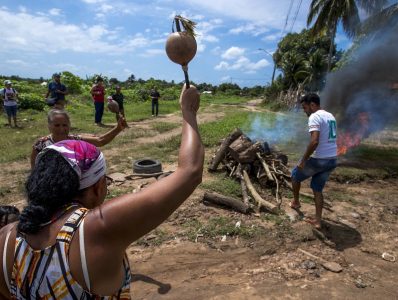Throughout 2019, the Pastoral Land Commission (CPT) recorded 1833 conflicts in the countryside (averaging five per day), 23% more than in 2018. This is the highest number on CPT records in the past five years.
There was also a 14% increase in the number of murders (from 28 to 32), 7% more attempted murders (from 28 to 30), and 22% more death threats (from 165 to 201).
In an interview with Real World Radio, Isolete Wichinieski, member of the National Coordination of the CPT, highlighted that while the numbers recorded by the organization over the past 35 years are thorough, they are merely a “sample” which provides an overview of the numerous conflicts over land and territories, water, and labor issues around Brazil.
Of the 32 land and territory defenders murdered, three victims were women. Wichinieski stressed that there is special viciousness in crimes against women: 102 women suffered acts of torture and those murdered showed signs of torture.
The violent hate speech against peasants and Indigenous Peoples used by Brazilian President Jair Bolsonaro during his first year in office “puts peasants and Indigenous Peoples as the enemies of development in the countryside”, said Isolete Wichinieski (CPT).
In its report, “Conflicts in the countryside 2019”, the CPT states that Bolsonaro’s discourse “can explain the rise of violence in the countryside” from one year to the other, with his defense of private property and legitimation of the use of weapons by landowners to attack indigenous communities. In fact, 320 indigenous families were expelled by self-declared “owners” of the land, an action that could be exacerbated if Provisional Measure MP 910/19 [1] is passed.
One of the consequences of Bolsonaro’s attitude has been that the Legal Amazon (which includes nine provinces) has become the region with the most land conflicts (20% in total). Nine indigenous people were murdered there in 2019 — the highest number of cases in the past decade. To this we must add the impacts of the Amazon fires [2], as part of the expansion of agricultural frontier through using slash-and-burn practices (“queimadas”) to deforest this area famously known as the “lungs of the planet”.
Conflicts over land
Of the 1254 conflicts recorded, 1206 were land conflicts involving some kind of violence, caused by supposed owners and/or land grabbers.
There was a huge rise in the number of evictions in the South (450%), Mid-West (114%) and North (55%) regions.
Provisional Measure MP 910/19, currently under discussion in the Brazilian Parliament, would authorize the misappropriation of millions of hectares of vacant lands. It could legalize currently unauthorized occupations of large landowners, extending them by 1500 to 2500 hectares. This would displace native indigenous and afro-descendant communities who have been living in these territories for years.
In addition, the MP does not recognize the environmental crimes committed by these landowners, and would allow them to exploit workers in conditions similar to slavery.
For the first time, the report includes text written by an indigenous person, Sônia Guajajara, member of the Executive Coordination of the Articulation of Indigenous Peoples from Brazil (APIB). In her text, she describes the attacks and violations against the rights of Indigenous Peoples during the first year of Bolsonaro’s administration. “Since Jair Bolsonaro took office as President of the Republic in January 2019, we are suffering an intense and serious offensive against the rights of Indigenous Peoples in Brazil,” stated Guajajara.
Conflicts continue in communities during the pandemic
Amid this context of violence against peasants, Indigenous Peoples, quilombola and afro-descendant people, the organized response in Brazil saw a record high in the number of demonstrations recorded by the CPT. There was a 142% increase compared to 2018. This means that there were 1301 demonstrations in 2019 (3.5 per day) for public education, against pension reform, and for the rights of peasant and indigenous women.
This year, the situation will be different due to the COVID-19 pandemic which is pushing people towards online discussions and actions, such as the Acampamento Terra Livre 2020. [3]
